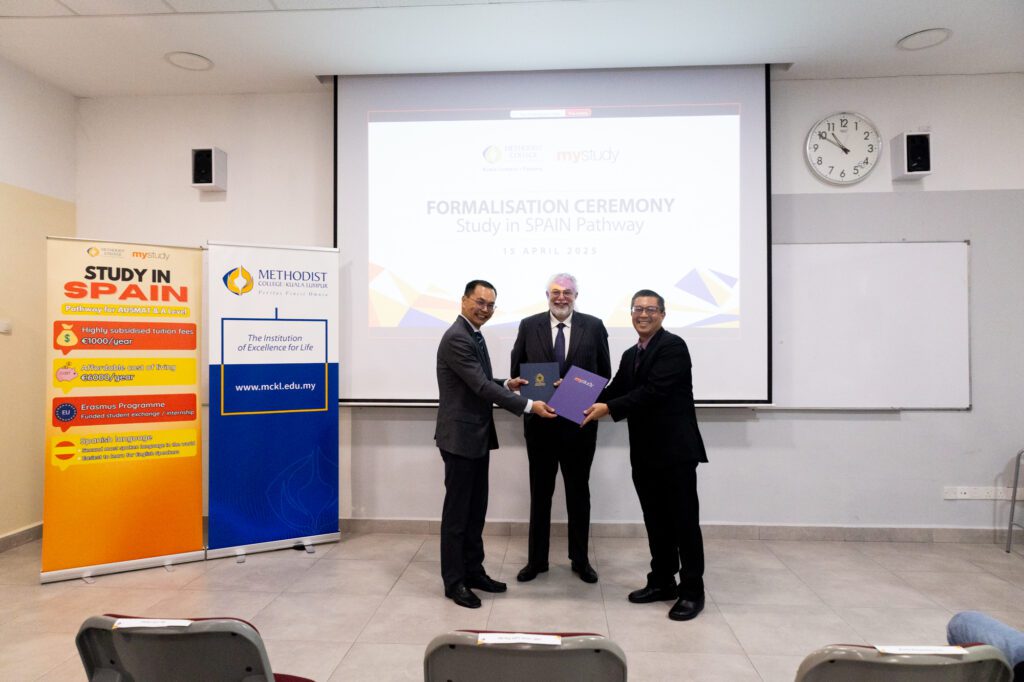Methodist College Kuala Lumpur (MCKL) has launched the “Study in Spain Pathway” for students in Malaysia, streamlining the process from language learning to university applications.
While the European country isn’t the most obvious choice for studying abroad, unlike the US, UK, or Australia, it holds a long list of merits that you won’t find anywhere else.
The official launch of the Study in Spain Pathway took place in April 2025 as a collaboration between MCKL and MyStudy, an organisation that makes studying abroad accessible to you.

MCKL has been providing holistic education to students across Malaysia and beyond since 1983. Source: MCKL
“We are trying to encourage students to go out and see the world,” says CK Chiau, the executive director of MyStudy. “To step out of your comfort zone when you are young and learn about the world; multinational companies want that kind of exposure.”
MCKL is recognised as a “feeder to university” in Malaysia, offering pathways for Sijil Pelajaran Malaysia (SPM) and IGCSE students to experience international education. Following the success of the German pathway, the college experienced an increasing demand for Spain as a study destination, with several MCKL alumni already achieving success there.
“Students from MCKL, after A Levels, reached out to MyStudy and were looking for destinations other than Germany, the UK, or Australia because they couldn’t afford it — so that’s why we proposed Spain to them,” says Chiau. “They said, ‘It’s time for us to introduce the Spanish courses in co-operation with the AUSMAT and A Levels programmes.”

MCKL students have transferred to universities all around the world, like Spain, Germany, Singapore, Ireland, the US, and more. Source: MCKL
Why should you study in Spain?
Many brands you’d catch at a shopping complex come from Spain.
Think Llao Llao, a frozen yoghurt brand. Pamesa Cerámica, which designs ceramic walls and floor tiles for hotels across the world. Inditex, the parent company of Zara, Massimo Dutti, Pull&Bear, and more. Industries like automotive, textiles, agriculture, and more are thriving across the nation, not to mention there’s an abundance of historical sites to explore to keep your mind enlightened.
Students in universities in Spain can leverage these connections to gain experience or broaden their local network.
There are a myriad to choose from, such as the University of Valencia, one of the oldest in Spain, especially known for its programmes in natural sciences, life sciences, and medicine. You could opt for the University of Barcelona, ranked #82 in the Best Global Universities list by the US News & World Report, placing equally high in fields like arts and humanities, infectious diseases, ecology, and more.
“When [students] learn different things, or they’re exposed to different things than what they’ve grown up with, they also develop more holistically as people,” says Shalini Ragunath, the head of department for MCKL’s Cambridge A Levels programme. “They become more accepting of differences. They become more adaptable as people.”
The upside to choosing Spain as a study destination, in addition to the opportunities, is the relatively lower cost of living.
Generally speaking, it’s much cheaper to live in Spain than in the US and the UK. Countries like Spain, along with France, Germany, and Italy offer different variations of free, low, or subsidised tuition for international students, depending on whether the university is public or private.

Students need to pursue a pre-university programme that can be legalised by the Ministry of Education in Spain. Source: MCKL
How MCKL prepares you to study in Spain
As of 2024, there are 91 universities across Spain — 50 public, 41 private.
When pursuing the Study in Spain Pathway at MCKL, students must select a recognised Year 12 or pre-university programme, such as A Levels or AUSMAT. These certificates are accepted by the Ministry of Education in Spain, unlike the foundation programme, which Chiau advises students against.
Through MCKL’s partnership with MyStudy, the organisation handles these processes.
Chiau highlights an advantage of applying to study in Spain: a second chance to get into your preferred university or programme. “Any international student is allowed to sit for additional entrance exams for two subjects, English and Mathematics, unlike other countries that only base their A Levels as the final result to enter university.”

Through the Study in Spain pathway, students will take mandatory language classes at the Instituto Cervantes Kuala Lumpur. Source: MCKL
While completing their pre-university classes, they’ll take Spanish language classes at Instituto Cervantes Kuala Lumpur as a compulsory aspect of the Spanish pathway. Public universities in Spain require students to achieve a B2 level of language proficiency, as defined by the Common European Framework of Reference for Languages (CEFR).
“It’s really important to be in touch with the language every day,” says Llamas. “You can watch movies, you can watch shows. There is a somewhat big Spanish-speaking community here in KL, so you can try to meet some people and practice.”
Instituto Cervantes, a Spanish language school with a presence in 100 countries, offers a curriculum adapted to the CEFR, covering language, etiquette, and culture.
While the A2 level prepares you for daily life, it’s not until you’re at the B1 or B2 level that you encounter academic content. The school will teach you important cultural practices, like how to respond to the opposite sex if you’re uncomfortable with the standard greeting of two kisses on the cheeks.
“Spain and Malaysia are not that different, from my point of view,” says Pablo Llamas, the coordinator of the institute’s Malaysian branch. “We are really family-oriented. The weather is not so different in some parts of Spain, especially in the South and the Canary Islands. We also give a lot of importance to food in our culture.”

